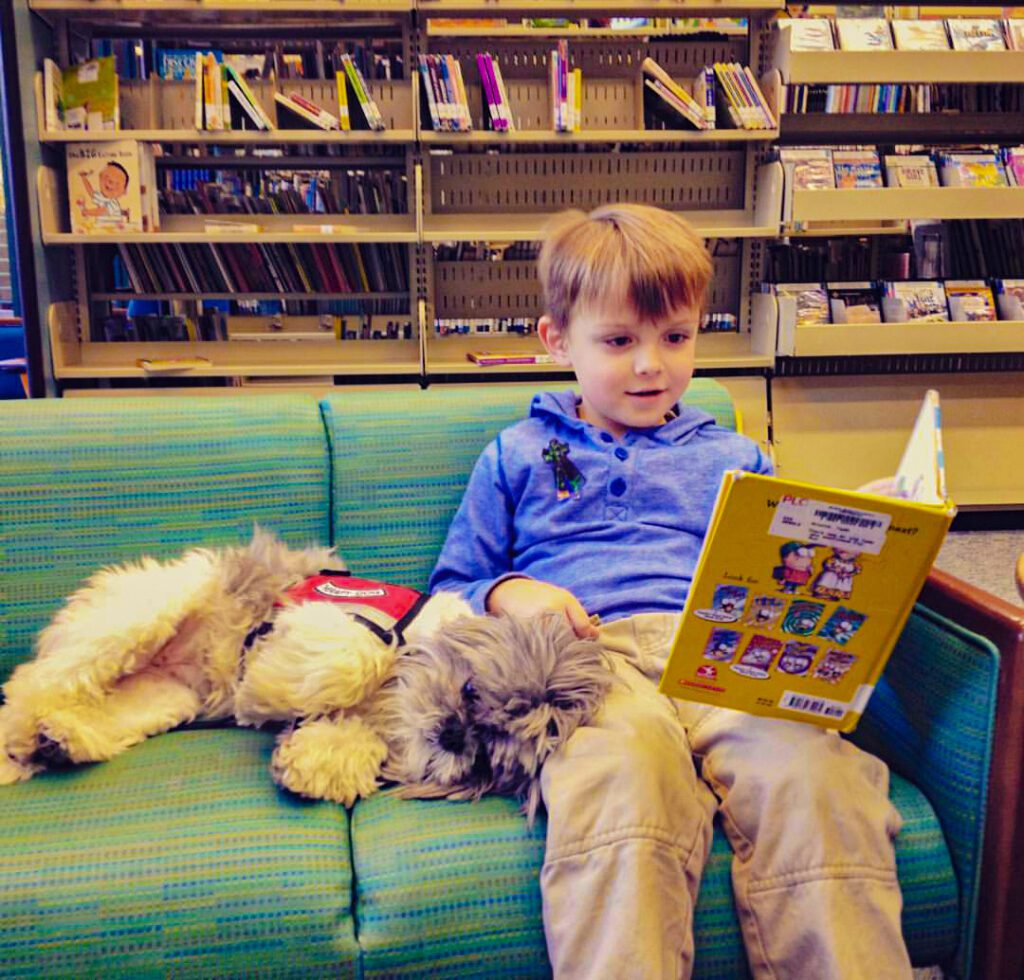Reading with Bonnie the Therapy Dog
by RACHEL CHRISTIAN
Cassandra Banning and Bonnie, her 10-year-old shih tzu therapy dog, have been bringing joy and happiness to people in the Plant City area for almost six years.
The pair can be spotted across town visiting nursing homes, hospitals, and even Bruton Memorial Library.
Unlike service animals that people are discouraged from petting, therapy dogs are meant to be cuddled and loved on.
And Bonnie is the perfect pup for the job.
“She is a dog that never meets a stranger,” Banning says.
Therapy dogs have become a popular way to improve the mental health of hospital patients, young children and even victims of crime. The idea is simple – certified animals can offer calmness, affection and comfort in stressful situations the way other forms of therapy may not.
Bonnie’s sweet demeanor has made her a minor celebrity over the years. Nurses at South Florida Baptist and Bartlow Regional Hospital look forward to the dog’s red vest and cheery personality. Staff even outfitted Bonnie with her own special hospital identification badge.
“Her visits help them forget, at least for a few minutes, that they have this highly stressful job,” Banning says.
The University of California Los Angeles (UCLA)’s website lists over a dozen studies linking positive mental health with therapy dog exposure. Even the simple act of petting animals triggers an automatic relaxation response, the site notes, promoting the release of serotonin, prolactin, and other hormones that can play a part in elevating moods.
There’s also growing research to suggest that therapy dogs have a positive impact on physical health, too – something Banning says she’s seen first-hand.
“After we were done visiting a patient once, a nurse went in and took the person’s blood pressure again,” Banning says. “It had dropped significantly. The nurse even made a note about it on their chart.”
Bonnie is also a weekly guest at the Bruton Memorial Library, where she stops by to provide some unassuming canine reassurance to young children learning how to read.
Instead of interrupting to correct pronunciation, Bonnie sits patiently beside youngsters and offers moral support.
Adults often forget how stressful it is to learn how to read, says Amanda Preece, youth services associate at the library.
That’s where Bonnie comes in.
“We noticed that it really helps children’s reading proficiency – how fluid their speech is when they read out loud,” Preece says. “She helps then loosen up and feel more comfortable.”
Bonnie has developed a loyal posse of fans at the library who await her arrival each Wednesday afternoon.
The library even threw a 10-year-old birthday party for the therapy dog June 26, complete with a puppy cake and a selection of dinosaur books kids could read to Bonnie.
“The dinosaur books are her favorite,” Preece says. “I’m serious.”
But not all dogs are cut out to be therapy dogs, and the process involves extensive training and testing. Animals must be obedient to their owners, docile, patient and quiet.
Banning says she became interested in training Bonnie after a neighbor went through the process with her shih tzu. Banning worked with Bonnie for months after adopting her from the animal shelter to prepare her for testing with the Alliance of Therapy Dogs, an international accrediting organization.
Simple obedience – like sit and stay – were obvious requirements, along with staying calm during loud noises and quiet when strangers petted her.
The pair had to pass a handling test and three observations with a tester in Dade City. The two needed a score of 100 percent on all criteria in order to pass the program.
Bringing Bonnie into the community felt like a way to give back for Banning, a resident of Plant City for 25 years. She remembers the strong sense of local pride and involvement in her town she felt after attending its world-famous Strawberry Festival.
“It wasn’t a matter of if you volunteered, it was with what group and for how long,” Banning recalled.
Taking Bonnie to the library and hospitals became a rewarding experience not only for patients and children but for Bonnie’s owner, too.
“It’s incredible to see someone who is in the hospital, who doesn’t want to be there and is in pain to suddenly brighten up and smile when they see Bonnie,” Banning says. “It’s a great feeling to know you’re helping improve someone’s life for a little while.”
